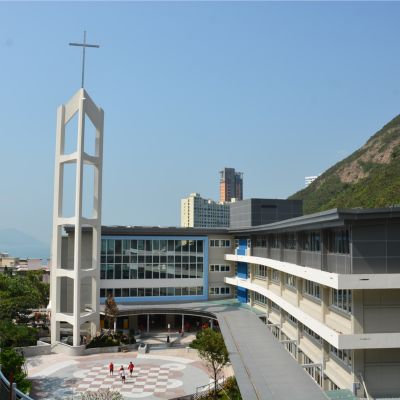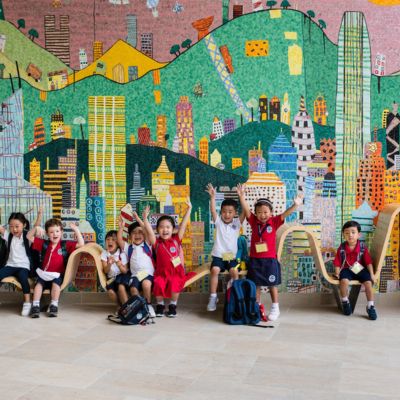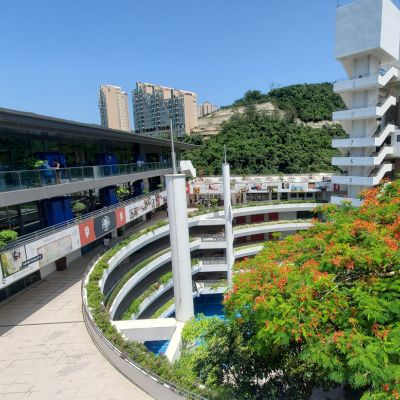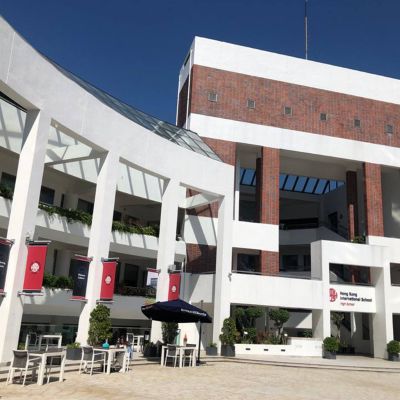Thank you for your interest in joining the vibrant learning community at Hong Kong International School! HKIS proudly serves around 3,000 students from over 45 nations from R1 (Pre-K) to Grade 12 and provides educational excellence with a difference. Within this diverse community, we focus on developing the whole child and are committed to nurturing each child to achieve his or her full potential.
Careers at HKIS
Together, parents, faculty, staff and students create the conditions for children's success and a healthy lifestyle. If those beliefs resonate with you, we welcome you to join our team of dedicated professionals at HKIS!
Faculty, administrators and staff come to HKIS first and foremost because of who we are, our educational program, and the attraction of working with exceptional colleagues and students. Our vibrant school community and the equally vibrant city of Hong Kong are great places to live and work.
Our aim is to honor our professional educators by providing a total compensation package that is globally competitive, rewards excellence, is commensurate with HKIS’ high expectation of its teachers, and delivers exceptional career opportunities.
New teacher hires are compensated based on level of education and years of relevant teaching experience up to a maximum of seven years. The annual salary is based on approximately 192 working days per school year and is paid over a 12-month period. Teaching contracts are for two years.Faculty members who are eligible for a housing benefit will reside in an HKIS-owned apartment. The apartment is based on family size and subject to availability. If all HKIS apartments are filled, then a housing subsidy is provided to the faculty member. Employees who receive relocation and/or housing benefits through their spouse's employer will not be eligible to receive those benefits from HKIS.
HKIS provides relocation assistance to faculty and administrators who are relocating to Hong Kong. This includes an airticket to Hong Kong and cash allowances to assist with the shipment of household goods and settling into Hong Kong.
Personal data collected will be used for recruitment purposes only. HKIS welcomes candidates who would like to apply for long-term or short-term substitute positions as Faculty, Teacher Assistant or Nurse, for all Grade levels.
Warning on Recruiting Scams
Hong Kong International School does not ask or require teacher candidates to send money for application fees, visas, or any other costs associated with recruitment or moving to Hong Kong. We do not ask applicants for information related to bank accounts or other private information. If you have been asked by HKIS or another international school to send money to cover such costs, you may be the target of an elaborate scam. Several international schools have had their web sites cloned, and candidates have been asked to send money as part of the scam. All candidates are urged to use extreme caution if they have been asked for money or private information.

Living In Hong Kong
Get to know what makes Hong Kong a unique place to live and sample the many cultural events on offer.
HKIS’s campuses are located in the more rural beach and country park area on the south side of Hong Kong Island. However, Hong Kong is very much an urban center, and it is important that teachers and their families have the ability to adjust to living overseas and city life.
All about Hong Kong
Helpful tips to understand what makes Hong Kong a unique place to live.
Western tastes and trends have heavily influenced Hong Kong’s culture, although the city is deeply rooted in its eastern culture and traditions. Hence, Hong Kong’s reputation as the “city where east meets west.” Visitors to the city usually appreciate the “old and new” scenario presented to them everywhere they walk. It is common to see a gleaming new, state-of-the-art skyscraper adjacent to a hundred year old temple.
Hong Kong celebrates Chinese festivals as well as significant dates on the western calendar such as Christmas. Most festivals revolve around families getting together and celebrating. These events are exuberant and colorful.
Lunar New Year
Usually falling around the beginning of February, is Chinese (or lunar) New Year. It is an important festival and considered as the time to prepare yourself for the coming year. House cleaning, purchasing new clothes and getting a haircut are all common pursuits as the New Year approaches. People buy flowers from specially arranged flower markets in the city center (especially Victoria Park near Causeway Bay) and visit with their relatives. There are spectacular firework displays, and people give Lai See, or lucky money to children.
Learn the expression “Kung Hei Fat Choi”, for everyone will be saying it, and you should return the greeting. It means Happy New Year!
Ching Ming
Ching Ming is the spring grave-sweeping festival in April in which families head to the cemeteries to spruce up their ancestors’ graves and make offerings that will ensure their deceased loved ones have sufficient money and food in the afterlife.
Tuen Ng Festival
Hong Kong celebrates this festival with Dragon Boat races. The tradition began in the third century BC, apparently after fishermen tried to rescue a despondent government official who had thrown himself into a river. Dragon Boat races are an international event for Hong Kong, attended by thousands.
Mid-Autumn Festival
This festival takes place in September and celebrates the 14th century uprising against the Mongols. Children especially enjoy this festival as they make lanterns and parade them in front of their parents while watching the moon rise. Traditional moon cakes are eaten.
Cheung Yeung Festival
On the ninth day of the ninth lunar month (usually in October), Hong Kong people climb to the highest point they can find. The festival had little early significance until the British took possession of Hong Kong. Since then, it has grown in popularity. Today, the hiking trails become very crowded during this festival.
You will not be short of things to do in Hong Kong. If you are interested in sports there are plenty of options. Hiking trails also abound from the easy stroll to the strenuous uphill treks, and you could top your hike off with a touch of wakeboarding or swimming at one of the many beaches.
There are also a wide variety of cultural opportunities. Numerous galleries hold shows on a regular basis and other venues such as the Fringe Club showcase a variety of theater, music and art shows. There are comedy clubs to get you laughing. The city is also a popular stopping off point for visiting symphony companies, ballet troupes, dance groups, and rock musicians.
Shopping is a favorite past time in Hong Kong and no matter what you are looking for you should be able to find it. Wandering the streets you will find a plethora of little shops offering anything from local clothing to jewelry to electronics. There are also street markets that sell everything from souvenirs to household goods where you are sure to find a bargain. If you are looking for designer goods, you will be spoiled for choice. There are also a number of large department stores that sell a range of items and cater for both local and Western tastes.
Chinese and English are the official languages of Hong Kong. English is widely used in the Government and by the legal, professional, and business sectors. There is no shortage of well-educated competent bilingual or even trilingual professionals who speak English, Cantonese, and Mandarin in the city. These languages are vital for any enterprise trading in Hong Kong and doing business with Mainland China and internationally.
Hong Kong’s climate is subtropical, subject to monsoons and typhoons. Winters are cool and dry, while spring and summer are hot and humid. Temperatures range from lows of 50°F (10°C) in January to 95°F (35°C) in summer.
The currency is the Hong Kong dollar. It is readily convertible and is pegged to the US dollar at a current exchange rate of HK$7.8: US$1. Teachers’ salaries are paid 100% in Hong Kong dollars.
Hong Kong operates a simple, low and predictable tax system. Taxes are levied on three types of income – salaries, profits, and property. There is no value-added sales tax or capital gains tax. Only income earned in Hong Kong is taxable.
Everyone with a Hong Kong income is liable to pay salaries tax. The rate of tax after deductions and allowances is applied on a graduated scale, but the total salaries tax charged will not exceed 15% of a person’s total assessable income after deductions.
In order to enter Hong Kong for employment, investment, education, training, or residence you must obtain an entry visa prior to arrival. HKIS will apply for employment visas and, if applicable, dependent visas for family members. In the case of HKIS teaching couples, only one person needs to apply for an employment visa. The other can legally work on a dependent visa. Prospective employees must hold a passport that is valid for a minimum of 1 year; however, 2 years is preferable.
A wide range of living conditions exist in Hong Kong – from cosmopolitan areas with dense high-rise apartment blocks to low rise apartments neighboring modern alfresco dining outlets or traditional alley markets selling seafood and noodles. It is fortunate that wherever you live and whatever the condition of your dwelling, there are always open green spaces to unwind as approximately 40% of Hong Kong is reserved as country parks.
While there is a wide variety of accommodation, in terms of size and type, one thing to bear in mind is that apartments are considerably smaller than what many people from overseas are used to. The average size of an apartment for a single person is 600 square feet for a couple, and for a couple with a child it is 900 square feet, and for a family of four or more it is 1,200 square feet. Most apartments come unfurnished. HKIS teachers live in many different neighborhoods from Stanley and Chung Hom Kok to Happy Valley and Midlevels. To get some understanding of the housing market in Hong Kong and which websites to search, please get in touch with your HKIS HR representative.
High quality, easily accessible health care services are readily available in Hong Kong. The public hospitals and clinics in Hong Kong provide comprehensive medical services and are staffed by English speaking professionals. There are also private hospitals, such as Adventist Hospital, Matilda Hospital, and Canossa Hospital.
The public transportation system in Hong Kong is excellent and rates among one of the most efficient and reasonably priced in the world. Public transport includes a system of buses, trams, trains, metro and ferries. Taxis are readily available and reasonably priced.
Public transport can be paid for on an cash basis, but most residents use a stored value ‘Octopus’ card. Value is purchased, stored on the card, and deducted each time it is used for payment. These cards are also accepted at vending machines, convenience stores and public car parks.
It is very common in Hong Kong for individuals and families to employ someone to help look after their household and children. These employees are sometimes known as amahs or domestic helpers.
There are many avenues to explore when looking to hire a helper such as through an agency or referral from a friend or colleague.
Most large chain supermarkets and other specialty stores carry a wide range of western and Asian foods. The two main supermarket chains are Park n’ Shop and Wellcome. These supermarkets have home delivery and on-line ordering. Seasonal fresh vegetables and fruits are also available at the local markets whose products are less expensive than the “western style” markets.








